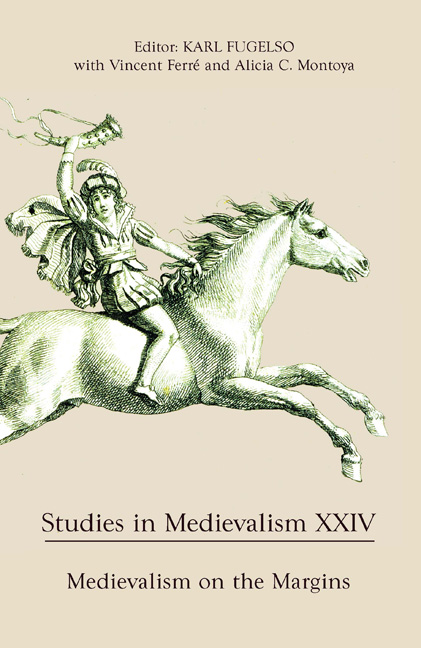Book contents
- Frontmatter
- Acknowledgments
- Contents
- List of Illustrations
- Volume XXIV 2015
- Editorial Note
- I Medievalism on the Margins: Some Perspective(s)
- 1 Medievalism in the Margins: Paratexts and the Packaging of Medieval French Literature
- 2 Medievalism Studies and the Subject of Religion
- 3 Pop Medievalism
- 4 Ecomedievalism: Applying Ecotheory to Medievalism and Neomedievalism
- 5 Whiteness and Time: The Once, Present, and Future Race
- 6 A Desire for Origins: The Marginal Robin Hood of the Later Ballads
- 7 Women, Queerness, and Massive Chalice: Medievalism in Participatory Culture
- 8 “Constant inward looking,” Medieval Devotional Literature, and the Concordium-Fruitlands Library
- II Trans-Atlantic Medievalism(s)
- III Other Interpretations
- Contributors
3 - Pop Medievalism
from I - Medievalism on the Margins: Some Perspective(s)
Published online by Cambridge University Press: 05 December 2015
- Frontmatter
- Acknowledgments
- Contents
- List of Illustrations
- Volume XXIV 2015
- Editorial Note
- I Medievalism on the Margins: Some Perspective(s)
- 1 Medievalism in the Margins: Paratexts and the Packaging of Medieval French Literature
- 2 Medievalism Studies and the Subject of Religion
- 3 Pop Medievalism
- 4 Ecomedievalism: Applying Ecotheory to Medievalism and Neomedievalism
- 5 Whiteness and Time: The Once, Present, and Future Race
- 6 A Desire for Origins: The Marginal Robin Hood of the Later Ballads
- 7 Women, Queerness, and Massive Chalice: Medievalism in Participatory Culture
- 8 “Constant inward looking,” Medieval Devotional Literature, and the Concordium-Fruitlands Library
- II Trans-Atlantic Medievalism(s)
- III Other Interpretations
- Contributors
Summary
Medievalism abounds in contemporary culture. One need look no further than the Capital One advertisements in which knights battle the commodity fetish,1 the Altoids' billboards commanding consumers to “Get medieval on your mouth,” or Quentin Tarantino's use of medieval torture as a threat and a paranoid homophobic wish-fulfillment in Pulp Fiction (“I'm gonna get medieval on your ass”), which is contextualized and analyzed by Carolyn Dinshaw in her foundational text, Getting Medieval, to find examples of medievalism in popular culture. Thematically, one of the most common genres in medievalism, Arthuriana, produces narratives that continue to entice viewers and readers of popular texts. One need not mention the mass consumption of fairy tales that are derived from the Middle Ages, the medievalism in Disney films, heavy-metal music, and video games, nor the dominance of the medievalism fundamental to work by J. R. R. Tolkien, as a means of gaining a foothold among any skeptics who might dare to doubt the centrality of medievalism in popular culture.
Given medievalism's prevalence in visual culture and its popularity among consumers, the argument that medievalism is marginal or marginalized within popular culture may seem counter-intuitive. Indeed, one might argue that hierarchical distinctions between high and low have been settled in debates within cultural studies. Yet, despite the apparent prominence of medievalism in popular culture, my argument is that pop medievalism remains on the margins of academic culture. Although it is socially acceptable to speak of popular medievalism, in the movement toward thinking about how the pop is a form of political and aesthetic resistance (which is a fundamental feature of cultural studies), the pop medieval continues to be perceived by medievalists as a form of scholarly barbarism: it is neither civilized nor sophisticated, and it adheres to neither the old nor the new philology. Even among those who dismiss the old or the new approaches to philology, it is difficult to find a balance between what has come to be seen as fan scholarship and what is bona fide academic scholarship.
- Type
- Chapter
- Information
- Studies in Medievalism XXIVMedievalism on the Margins, pp. 21 - 30Publisher: Boydell & BrewerPrint publication year: 2015



